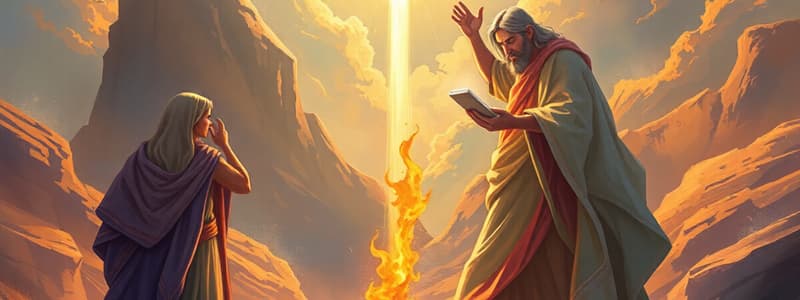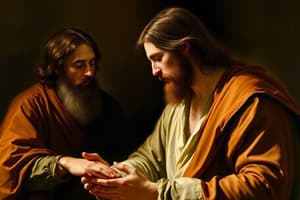Podcast
Questions and Answers
What do the Synoptic Gospels primarily summarize?
What do the Synoptic Gospels primarily summarize?
- The parables and miracles of Jesus
- The birth and early life of Jesus
- The resurrection and ascension of Jesus
- Jesus’ earthly life and teachings (correct)
What role does John the Baptist play in relation to Jesus?
What role does John the Baptist play in relation to Jesus?
- He foretells the coming of Jesus (correct)
- He is a rival prophet to Jesus
- He identifies Jesus as the Messiah
- He is the first disciple of Jesus
Which Gospel begins with a discourse on the Logos?
Which Gospel begins with a discourse on the Logos?
- Mark
- Luke
- John (correct)
- Matthew
According to the account of the Annunciation, what was Mary's response to the Angel Gabriel?
According to the account of the Annunciation, what was Mary's response to the Angel Gabriel?
What concept describes the nature of Jesus' mission during the Passion?
What concept describes the nature of Jesus' mission during the Passion?
Which heresy is specifically mentioned in relation to non-canonical Gospels?
Which heresy is specifically mentioned in relation to non-canonical Gospels?
Which of the following is NOT part of Jesus' understanding of humanity?
Which of the following is NOT part of Jesus' understanding of humanity?
What is primarily demonstrated through Jesus' resurrection narratives?
What is primarily demonstrated through Jesus' resurrection narratives?
What does the term 'kenosis' refer to in the context of Christ's sacrifice?
What does the term 'kenosis' refer to in the context of Christ's sacrifice?
Which model of salvation focuses on the idea that Christ's sacrifice satisfies divine justice on behalf of humanity?
Which model of salvation focuses on the idea that Christ's sacrifice satisfies divine justice on behalf of humanity?
What significant role does the Holy Spirit play in the process of sanctification?
What significant role does the Holy Spirit play in the process of sanctification?
What does the argument of Creation Ex Nihilo assert?
What does the argument of Creation Ex Nihilo assert?
Which of the following best describes the Nicene Creed's significance?
Which of the following best describes the Nicene Creed's significance?
What are the four marks of the Church according to Catholic teaching?
What are the four marks of the Church according to Catholic teaching?
In what way does Christian baptism differ from John’s baptism?
In what way does Christian baptism differ from John’s baptism?
What is the purpose of the Communication of Idioms in relation to Jesus?
What is the purpose of the Communication of Idioms in relation to Jesus?
Which heresy claims that Jesus was created and denies His divinity?
Which heresy claims that Jesus was created and denies His divinity?
What does the term 'resurrection of the body' symbolize in the Church's teaching?
What does the term 'resurrection of the body' symbolize in the Church's teaching?
Which statement best describes the benefits of baptism in Christian faith?
Which statement best describes the benefits of baptism in Christian faith?
What lesson did Christ's life and sacrifice reveal about God?
What lesson did Christ's life and sacrifice reveal about God?
Which statement accurately represents the Catholic Church’s view on eschatology?
Which statement accurately represents the Catholic Church’s view on eschatology?
The Church’s encouragement of scientific inquiry is grounded in what belief?
The Church’s encouragement of scientific inquiry is grounded in what belief?
Flashcards
Canonical Gospels
Canonical Gospels
The four Gospels that are accepted as part of the official Christian canon (Matthew, Mark, Luke, and John).
Synoptic Gospels
Synoptic Gospels
The Gospels of Matthew, Mark, and Luke, which tell the story of Jesus' life in a similar way.
John's Gospel
John's Gospel
A theological account of Jesus' life that emphasizes his divine nature as the Word of God.
Kenosis
Kenosis
Signup and view all the flashcards
Passion, Cross, and Resurrection
Passion, Cross, and Resurrection
Signup and view all the flashcards
Jesus' Two Natures
Jesus' Two Natures
Signup and view all the flashcards
Humanity's Intended Relationship with God
Humanity's Intended Relationship with God
Signup and view all the flashcards
Christology
Christology
Signup and view all the flashcards
Pre-existence of Jesus
Pre-existence of Jesus
Signup and view all the flashcards
Communication of Idioms
Communication of Idioms
Signup and view all the flashcards
Events of the Passion
Events of the Passion
Signup and view all the flashcards
Sermon on the Mount / Beatitudes
Sermon on the Mount / Beatitudes
Signup and view all the flashcards
Holy Spirit
Holy Spirit
Signup and view all the flashcards
Creation ex nihilo
Creation ex nihilo
Signup and view all the flashcards
Subjective Model of Salvation
Subjective Model of Salvation
Signup and view all the flashcards
Substitution Model of Salvation
Substitution Model of Salvation
Signup and view all the flashcards
Christus Victor Model of Salvation
Christus Victor Model of Salvation
Signup and view all the flashcards
One (Mark of the Church)
One (Mark of the Church)
Signup and view all the flashcards
Holy (Mark of the Church)
Holy (Mark of the Church)
Signup and view all the flashcards
Catholic (Mark of the Church)
Catholic (Mark of the Church)
Signup and view all the flashcards
Apostolic (Mark of the Church)
Apostolic (Mark of the Church)
Signup and view all the flashcards
Resurrection of the Body
Resurrection of the Body
Signup and view all the flashcards
Study Notes
I. Gospels
- Four Canonical Gospels: Matthew, Mark, Luke, and John
- Synoptic Gospels (Matthew, Mark, Luke): Summarize Jesus' earthly life, beginning with his nativity and lineage.
- John's Gospel: Offers a theological perspective on Jesus' life, starting with the Logos (the Word) being God and becoming flesh.
- Other Gospels (Gospel of Thomas, Gospel of Mary Magdalene): Deemed non-canonical due to theological inaccuracies or lack of apostolic origin.
Luke's Account of the Annunciation and Visitation
- Annunciation (Luke 1:26-38): Gabriel announces Mary's conception of Jesus. Mary humbly accepts.
- Visitation (Luke 1:39-56): Mary visits Elizabeth, who recognizes her as the mother of the Lord.
- Connection between John the Baptist and Jesus: Both births foretold by angels. Zechariah doubted, while Mary believed. John prepared the way for Jesus.
Dynamics of the Passion, Cross, and Resurrection
- Passion and Cross: Jesus' suffering and death demonstrate self-emptying love (kenosis), not divine punishment. True power is shown in resurrection, not in taking a life.
- Resurrection Narratives: Demonstrate the historicity of the resurrection. Jesus confronts betrayal and abandonment peacefully.
II. Christology
- Jesus' Divine Personhood: Fully human and fully divine.
- Jesus' Humanity: Teaches the purpose of humanity (relationship with God and others).
- Jesus as the Divine Logos: Pre-existed creation, begotten, consubstantial with the Father, second person of the Trinity.
- Communication of Idioms: Explains how Jesus' divine and human natures are united.
III. Pneumatology
- The Holy Spirit: Third person of the Trinity, consubstantial with the Father and Son.
- Holy Spirit's Works: Creation, redemption (present at Jesus' baptism and empowering the church), sanctification (guiding to holiness).
IV. Creation
- Creation Ex Nihilo (Tertullian): God created from nothing, demonstrating omnipotence. Creation as a distinct act, not an extension of God.
V. Soteriology
- Three Models of Salvation:
- Subjective: Personal faith.
- Substitution: Christ's sacrifice satisfies divine justice.
- Christus Victor: Christ's death and resurrection defeat sin, death, and the devil.
- True Meaning of Sacrifice: Kenosis (self-emptying love). Christ's sacrifice dispels false notions of appeasing the divine.
- Revelation of God's Truth: Christ reveals God's nature, allowing for a proper human relationship with God.
VI. Four Marks of the Church
- One: Unified body of believers.
- Holy: Set apart for God's purpose.
- Catholic: Universal, for all people.
- Apostolic: Founded on the Apostles' teachings.
VII. Baptism
- John's Baptism vs. Christian Baptism: John's baptism called for repentance, Christian baptism cleanses sin and incorporates believers into the Church, granting sanctifying grace.
- Infant Baptism: A theological division on the age of accountability. Catholic practice emphasizes God's grace.
- Effects of Baptism: Forgiveness, new creation, sanctifying grace, incorporation into the body of Christ, participation in the priesthood of Christ, indelible mark.
VIII. Eschatology
- Resurrection of the Body: Glorified bodies united with souls.
- Millennialism: Belief in a 1,000-year reign of Christ. No definitive Catholic view.
IX. Heresies
- Arianism: Denies Jesus' divinity.
- Dynamic Monarchianism (Adoptionism): Claims Jesus was adopted as God's son.
- Marcionism: Rejects the Old Testament.
- Modalistic Monarchianism (Modalism): God in different modes.
- Nestorianism: Denied Mary as Mother of God.
- Gnosticism: Believes secret knowledge provides salvation.
X. Creeds
- Nicene Creed: Defines the Trinity and Christ's nature, refuting heresies.
XI. Faith, Reason, and Science
- Christianity and Greek Philosophy: Integration of ideas by thinkers like Augustine and Aquinas.
- Church's Stance on Science: Encourages inquiry aligning with faith and morals.
- Ordered World and Modern Science: The concept of an ordered universe paved the way for the scientific method.
Council of Nicaea (325 AD)
- Key historical event in early Christian history.
Studying That Suits You
Use AI to generate personalized quizzes and flashcards to suit your learning preferences.




